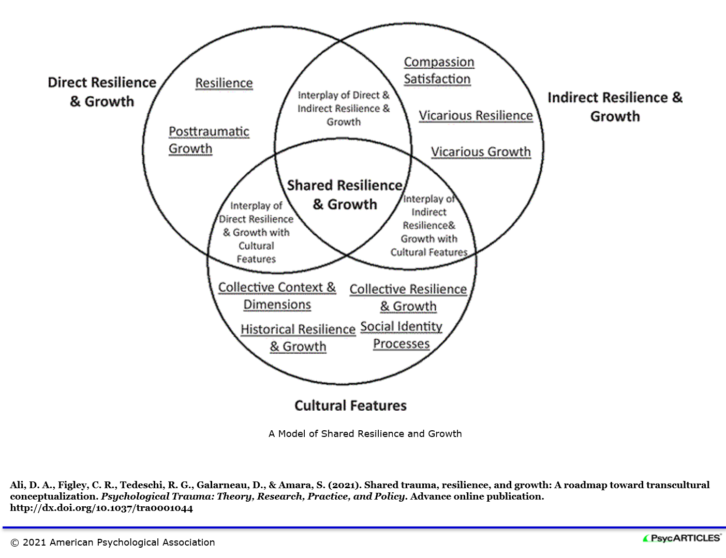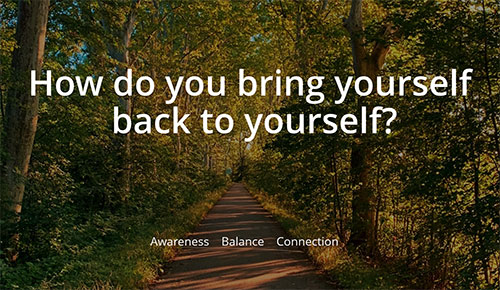In this presentation, we explore the integration of compassion-based approaches and expressive arts in programs for promoting resilience and growth in face of shared trauma.
The COVID-19 pandemic caused unprecedented disruptions to our personal, social and professional lives (Slavich, Roos & Zaki, 2022). Such disruptions are likely to have psychological impacts far-reaching and long-lasting bringing new and unique challenges that had the potential to impact experience of burnout.
Programs that promote resilience and prevent burnout are needed to support the resilience of healthcare practitioners, who are often exposed in such situations to immense psychological strain due to working in high-pressure and emotionally demanding environments. Irrespective of the specific intervention, major components in helping individuals affected by traumatic exposure are safety and stabilizing, processing of the trauma, and reconnection and integration.
The more complex the traumatic experience and its aftermath, the more multicomponent, and multimodal interventions are called for to effectively address the diverse dimensions of the situation. This presentation focuses on the transformative potential of cultivating self compassion in face of trauma.
Promoting Resilience through Cultivating Self Compassion:
Resilience refers to the process of adapting successfully to disturbances (adversity, trauma, pressure, or stress) that threaten an individual’s growth and function. Self-compassion increases individuals’ resilience in the face of such stressors (Slavich, Roos & Zaki, 2022). By treating ourselves with kindness and understanding, we can become more resilient to the challenges life throws our way.. Self compassion reduces isolation, shame proneness, maladaptive perfectionism and over-identification (Neff, 2016; Andel et al, 2021).
Self-compassion is an individual’s tolerance and compassion for himself in suffering (Neff, 2003). Self-compassion consists of six components: self-kindness, self-judgement, common humanity, isolation, mindfulness, and over-identification.
Self-kindness is described as the tendency to be caring and inclusive towards one-self rather than indifference or judgmental. Common humanity refers to seeing one’s experience as a universal experience, rather than seeing one-self as the center of pain that can lead to feelings of isolation. Mindfulness is supposed to be a clear and calm attitude towards the suffering of the moment rather than over identifying with them.
Self-compassion, as an emotional regulation strategy, has been found to mediate between social support and an individual’s post-traumatic responses (Compassion literally means “to suffer with", which implies a basic mutuality in the experience of suffering. Extending compassion towards oneself has been found to reduce burnout and compassion fatigue in caregivers and practitioners (Beaumont, Durkin, Martins, & Carson, 2015).
When we're under pressure, our clinical judgment and decision making can become narrow and rigid; reliance on biases can be excessive, and emotions can influence our beliefs and opinions (Muran & Eubanks, 2020). As a result of a lack of reliable feedback, we may fail to recognize how these factors are affecting us.
A sense of belonging, compassion, and kindness are important ingredients for fostering resilience, recovery, and growth (Slavich, Roos & Zaki, 2022). A review of the research over the past few years demonstrates how compassion practices can counter compassion fatigue (Bentley, 2021). Practitioners who practiced self compassion during the pandemic reported less fear, more emotional safety, and less burnout (Haeshem & Zeinun, 2021; Kotera., & Van Gordon, 2021).
Shared humanity:
One of the most important elements of self-compassion is the recognition of our shared humanity.
We are all fallible.
Accepting that suffering is part of a larger shared human experience and struggles (i.e.,common humanity) can help reduce perceived stress and increase positive affect (Slavich, Roos & Zaki, 2022). Fears of compassion (for self, for others and from others), on the other hand, have been found to magnify the experience of perceived threat of COVID-19 on mental health.
Compassion involves turning towards and not away from difficulties, including our own. However, developing compassion for oneself can be difficult for many of us. Recognizing misgivings regarding self-compassion as well as potential barriers to receiving compassion from others is therefore important in improving staff support (Bentley, 2022; Matos et al, 2021). By maintaining humility about our abilities and our approach, we can foster trust and connection in our work.
Patience:
In addition to paying attention with mindful curiosity to what unfolds moment by moment, in times of tension or strain, it is also necessary to zoom out from time to time and look at the big picture. We may become so absorbed in a conflict moment that we fail to notice that we are stuck—in a vicious cycle or self-defeating pattern (Muran & Eubanks, 2020).
We may feel the urge to fix things, soothe an angry patient and smooth over tension when we are in conflict, or defend ourselves when we feel wronged during a conflict. Our sense of helplessness and worthlessness, when things seem stuck, may lead us to do something, anything, to alleviate our sense of helplessness. Recognizing this and seeing what is going on in a broader context is essential (Muran & Eubanks, 2020).
Taking a step back instead of reacting immediately requires patience.Rather than rushing to end it before we understand what is happening, we can be patient to let it unfold. An attitude of patience allows us to be more flexible and open to different solutions and approaches. It can help us see the bigger picture and create better outcomes for ourselves and our clients.
Creativity:
"Constraints are catalytic forces that stimulate exciting new approaches and possibilities. They can make us more than we were, rather than less we could be. In play, we understand that our limitations our favorite game’s rules impose also give that game character, energy, and pleasure.(p.2). Morgan and Barden, 2015, p,2 cited in Selekman, 2021).
Compassion is, by definition, relational. The challenges that the COVID-19 pandemic has posed for practitioners provided transformative opportunities to strengthen their connections with others and find new ways to deal with longstanding difficulties (Selekman, 2021).
Walsh (2016) differentiates between shared resilience and shared posttraumatic growth, which are differentiable outcomes of adjustment to a shared collective stressor. Shared posttraumatic growth refers to positive effects of a shared traumatic reality on health care providers beyond resilience (Ali et al, 21). Shared posttraumatic growth is a promising area of inquiry but much remains to be learned
Policy, 12(4), 331-335.
of mindfulness, values, and self-compassion. Psychology, Health & Medicine, 0(0), 1–14
outcomes. Frontiers in psychology, 10
A MODEL OF SHARED RESILIENCE & GROWTH

Self-Compassion Guided Practices and Exercises from Dr. Kristin Neff
- Compassion with Equanimity (Download). [Audio – 6 minutes]
- Soles of the Feet (Download). [Audio – 5 minutes]
- Tender Self-Compassion Break (Download). [Audio – 5 minutes]
- Motivating Self-Compassion Break (Download). [Audio – 7 minutes]
- Providing Self-Compassion Break (Download). [Audio – 7 minutes]
- Balancing Yin and Yang (Download). [Audio – 13 minutes]
- Protective Self-Compassion Break (Download). [Audio – 8 minutes]
- Fierce Friend (Download). [Audio – 15 minutes]
- Self-Compassion for Caregivers [Video – 9 minutes]
- Compassionate Friend (Download) [18 minutes]
- Giving and Receiving Compassion (Download). [20 minutes]
- Affectionate Breathing (Download) [21 minutes]
- Compassionate Body Scan (Download) [24 minutes]
- Loving-Kindness Meditation (Download) [20 minutes]
- Self-Compassion/Loving-Kindness Meditation (Download) [20 minutes]
- Noting Your Emotions (Download) [18 minutes]
- Soften, soothe, allow: Working with emotions in the body (Download) [15 minutes]
- General Self-Compassion Break (Download) [5 minutes]
A human being is part of the whole, called by us ‘universe,’ a part limited in time and space. He experiences himself, his thoughts and feelings, as something separate from the rest — a kind of optical delusion of consciousness. This delusion is a kind of prison for us, restricting us to our personal desires and to affection for a few persons nearest to us. Our task must be to free ourselves from this prison by widening our circle of compassion to embrace all living creatures and the whole of nature in its beauty- Albert Einstein


